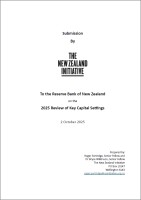Why council liability reforms won’t save us from the perils of judicial lawmaking
In August 2025, the Government announced the biggest reform to New Zealand’s building consent system in two decades. The problem? Read more

Roger Partridge is chairman and a co-founder of The New Zealand Initiative and is a senior member of its research team. He is a regular commentator in the media on public policy and constitutional law. He led law firm Bell Gully as executive chairman from 2007 to 2014, after 16 years as a commercial litigation partner. He is an honorary fellow of the Legal Research Foundation, a charitable foundation associated with the University of Auckland and was its executive director from 2001 to 2009. He is a member of the editorial board of the New Zealand Law Review and was a member of the Council of the New Zealand Law Society, the governing body of the legal profession in New Zealand, from 2011 to 2015. He is a former chartered member of the Institute of Directors, a member of the University of Auckland Business School advisory board, and a member of the Mont Pelerin Society.
Phone: +64 4 499 0790
In August 2025, the Government announced the biggest reform to New Zealand’s building consent system in two decades. The problem? Read more
For almost all of human history, life was a grind. Most people lived and died poor, generation after generation. Read more
This month’s Nobel Prize in Economics arrives at an opportune moment. The award to Joel Mokyr, Philippe Aghion and Peter Howitt for having explained innovation-driven economic growth provides a salutary reminder about what drives prosperity. Read more
New Zealand’s fastest-growing sector isn’t tourism, dairy, or technology. It’s outrage. Read more
Most New Zealanders would struggle to explain what bank capital requirements are, let alone why they matter. Yet the Reserve Bank’s controversial 2019 decision to nearly double these requirements affects every mortgage holder and business borrower in the country. Read more
Every time New Zealanders apply for a mortgage or business loan, they pay the price for the Reserve Bank’s controversial 2019 bank capital decision to increase capital requirements for major banks by almost 100%. The decision made our banks much more heavily capitalised than most of their international peers. Read more

1. INTRODUCTION AND RECOMMENDATIONS 1.1 This submission to the Reserve Bank of New Zealand (RBNZ) on its 2025 Review of Bank Capital Requirements (the Review) and accompanying consultation paper (the Consultation paper)1 is made by The New Zealand Initiative, an independent think tank supported primarily by major New Zealand businesses. Read more

Roger Partridge talked to Sean Plunket on The Platform about his analysis of how New Zealand judges are returning gang patches to offenders despite Parliament's clear intention to ban them through the Gangs Act 2024. He argued that courts are overstepping their constitutional role by using judicial tools like the "principle of legality" and tikanga considerations to sidestep Parliament's democratically expressed will, undermining both the rule of law and democratic legitimacy. Read more
Roger Partridge talked to Francesca Rudkin on Newstalk ZB about the NZ Herald's Mood of the Boardroom survey, describing business leaders' sentiment as "grim" due to New Zealand's struggling economy and high cost of living. He called for greater bipartisanship on long-term economic issues like retirement savings and infrastructure, while noting that Trump's tariffs have significantly impacted CEO confidence despite the global community underestimating the reality of his trade policies. Read more
When Parliament says gang insignia “is forfeited to the Crown,” citizens are entitled to assume those words mean what they say. Yet on 11 August the District Court ruled otherwise. Read more
In New Zealand economics, numbers have personalities. Two supermarkets are a duopoly. Read more
Wellington (Tuesday, 16 September 2025) – The New Zealand Initiative welcomes the Government’s decision to strengthen the governance of the Commerce Commission, describing it as an important step towards world-class regulatory practice. The Initiative’s 2018 report Who Guards the Guards? Read more
Who is responsible for defending liberal democracy when its norms come under attack? Karl Popper, writing as fascist armies swept Europe, understood this was not an abstract question. Read more

Every day, New Zealand workers clock longer hours than their peers in most developed nations yet produce far less value per hour worked. This productivity paradox has haunted our economy for decades, condemning workers to lower wages and longer working days. Read more
When housing policy is split among more than six ministers, who is responsible when the affordability crisis drags on year after year? The Minister of Housing? Read more